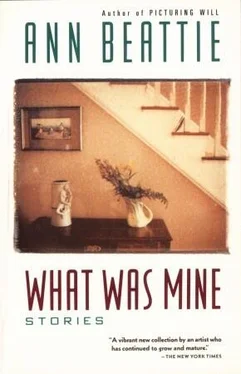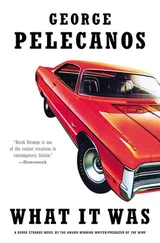Ann Beattie - What Was Mine
Здесь есть возможность читать онлайн «Ann Beattie - What Was Mine» весь текст электронной книги совершенно бесплатно (целиком полную версию без сокращений). В некоторых случаях можно слушать аудио, скачать через торрент в формате fb2 и присутствует краткое содержание. Год выпуска: 1992, Издательство: Vintage, Жанр: Современная проза, на английском языке. Описание произведения, (предисловие) а так же отзывы посетителей доступны на портале библиотеки ЛибКат.
- Название:What Was Mine
- Автор:
- Издательство:Vintage
- Жанр:
- Год:1992
- ISBN:нет данных
- Рейтинг книги:5 / 5. Голосов: 1
-
Избранное:Добавить в избранное
- Отзывы:
-
Ваша оценка:
- 100
- 1
- 2
- 3
- 4
- 5
What Was Mine: краткое содержание, описание и аннотация
Предлагаем к чтению аннотацию, описание, краткое содержание или предисловие (зависит от того, что написал сам автор книги «What Was Mine»). Если вы не нашли необходимую информацию о книге — напишите в комментариях, мы постараемся отыскать её.
What Was Mine — читать онлайн бесплатно полную книгу (весь текст) целиком
Ниже представлен текст книги, разбитый по страницам. Система сохранения места последней прочитанной страницы, позволяет с удобством читать онлайн бесплатно книгу «What Was Mine», без необходимости каждый раз заново искать на чём Вы остановились. Поставьте закладку, и сможете в любой момент перейти на страницу, на которой закончили чтение.
Интервал:
Закладка:
Several days later, the key to the Brunettis’ house arrived in an envelope in the mail, Scotch-taped to the back of a postcard of cows in a field. “Maybe they know they preside over Heaven on Earth!” Lou had written underneath the information printed at the top: that there were 450,000 cows in Vermont. Pia’s note was warm, thanking them several times for picking up the dinner check. Warmer than she had been in person, Fran said sadly, handing the note to Chap. In the note, Pia told them how to open the door, what to do if the sump pump did not come on during a hard rain, and the peculiarities of one burner on the gas stove. There was a P.S., telling them that mosquitoes bit more when the body was warm. After a dip in the stream behind the house, Pia said, they could sit on the banks for twenty minutes or half an hour without being bitten.
When they began to walk around the house, sensing the shape of lamps and fumbling for buttons or switches to turn them on, they noticed, immediately, that the Brunettis had become collectors: of wooden decoys, hand-tinted photographs, glass insulators, silver candlesticks. It was a big house, but so low-ceilinged it felt constricting, in spite of the four-over-four windows that came almost to the floor. For a while, disoriented, they noticed small things; the house had been added on to so many times, the configuration of rooms was impossible to predict. The long span of shelves in the living room sagged from age, not from the weight of books. Lou’s architecture books, many of them oversized, were lined up on the bottom shelves, but the rest of the shelves held only a few paperbacks. As they toured the living room, they found pepper shakers from the fifties: Scottie dogs and pirouetting ballerinas whose craniums poured salt and pepper; seven box cameras in a row; at least a dozen unpaired ladies’ shoes, fancy high heels from the forties; hair combs displayed standing upright in shallow bowls filled with sand; Roseville vases; replicas of the Eiffel Tower. The Italian landscapes both of them had always admired were there, clustered now in the hallway that led to the kitchen instead of interspersed throughout the house. Mastering the Art of French Cooking was in the kitchen, but Fran could see no other cookbooks; it looked as if the book had been put in the bookstand and placed in the center of the counter so Fran wouldn’t miss seeing it. More decoys were clustered at the far end of the counter. On the refrigerator, another picture of the intense Anthony stared them in the eye. There was a postcard of the evangelist Matthew (Fran took it off the freezer door and turned it over; it was from a museum in Germany), and several photographs, slightly overlapping, of what was probably the Brunettis’ garden: phlox, gladiolas, columbine, twiggy lilacs.
Chap turned on the faucet, filled a coffee mug with water, and glugged it down. He turned the mug upside down and put it in the dish drainer. It was what he did at home — just upended a glass or mug as if he hadn’t drunk from it. Fran bit her tongue and turned back toward the refrigerator. There was a picture of an elderly lady she did not recognize. Everything was held in place with magnets shaped like clouds. Droplets of rain fell from the cloud holding the postcard of Matthew to the refrigerator. Four differently shaped clouds not in use were lined up vertically next to the door handle. Fran moved them until they were separated by wider spaces, pushing one higher and another lower, the way clouds would really look in the sky.
“It’s certainly not their house in Cambridge, is it?” Chap said.
Outside, moths fluttered against the glass, seeking the light. She saw on the counter a spray can of Yard Guard and another can of Deep Woods Off. A mosquito buzzed her ear. Reflexively, she flinched and ducked. Chap ran toward her, clapping his hands. He was as quick as a snake’s tongue. A bug hardly ever escaped him. At home, if a cricket or a lightning bug got in, she would have to holler out quickly so he wouldn’t kill it. She always got a glass and the notepad they kept by the kitchen phone so she could capture nice insects and release them outdoors. He chided her. “You let in more than you free,” he said. Still, something made her patiently stalk them, and she felt victorious when she pulled her hand back inside after shaking out the glass and finding it empty. That had happened the night before they left for Vermont. “What does your crystal ball say?” Chap had asked, passing by in his pajamas as she was closing the door with her foot and gazing into the bottom of an empty glass. And she had thrown it at him. Not hard — she had more or less tossed it, but it had caught him by surprise; he hadn’t ducked, and it had hit him in the shoulder. He winced, more perplexed than angry. Several expressions crossed his face before he pulled his chin in tight to his throat as if to say: What’s this?
“It looks like one of those antique shops that’s set up to look like somebody’s house when actually everything’s for sale,” she said.
“The decoys must be his,” Chap said.
“Jesus,” she said. “We don’t collect anything. I wonder when they started doing this?”
He leaned against the counter, the moths behind his head like large, durable snowflakes. She thought of Anthony’s letter — the one he had sent about Christmastime, telling her about the new lights the college in town had installed so people could cross-country ski at night. Everything the Brunettis wrote made the town sound idyllic. Cows — whether or not they were presiding over heaven — were not dear to Fran’s heart, but what she had heard about the horses made her curious to see them, and from the photographs on the refrigerator, she could tell she was going to love the garden. She and Chap had enough sunny land behind their house to garden. She wondered why they never had. She began to fantasize that there would be endless herbs. As a child, she had stood in her grandmother’s dill patch, tickling her nose with a stalk of the delightful, feathery stuff, hoping a wind would blow other big stalks her way to touch her legs. She looked again at the picture of the elderly lady on the refrigerator. The woman was eating something from a plate on her lap. It looked like white-frosted cake. Strawberry shortcake? Or a mound of vanilla ice cream? She suddenly wondered if there would be a farmers’ market in town; if there might be special dinners at the firehouse, or even some celebratory day. In the town her grandmother had lived in, they had had an annual celebration to commemorate the day the library opened. She had gotten her first kiss in a rowboat on the lake in that town on the seventeenth anniversary of the opening of the library. Her grandmother’s next-door neighbor had taught her how to spot the constellations.
“You collect cookbooks,” Chap said suddenly. “Isn’t that what you always look for in airport bookshops?”
They were on the Brunettis’ screened porch. It seemed quite large, but she could not put her finger on the light switch. As her eyes focused a little better in the dark, she went toward a cord dangling from a ceiling light. She pulled it and a breeze started up; it was a fan, not a light. Then Chap found the light switch and two sconces flickered bright on the far side of the porch, at each corner. In a few seconds Chap had also pulled the chain on a table lamp, so the porch was almost as bright as the kitchen.
“The place goes on and on,” Chap said.
She looked at him. “A little jealous of the Brunettis’ house?” she asked, raising her eyebrows. He shook his head no, walking toward her.
“Well, maybe in the daylight,” he said, hugging her.
Feeling his body against hers, and feeling his fingertips pressing into her, she said: “Honey, I don’t buy cookbooks for the recipes, you know. I buy them if they have funny old-time illustrations.”
Читать дальшеИнтервал:
Закладка:
Похожие книги на «What Was Mine»
Представляем Вашему вниманию похожие книги на «What Was Mine» списком для выбора. Мы отобрали схожую по названию и смыслу литературу в надежде предоставить читателям больше вариантов отыскать новые, интересные, ещё непрочитанные произведения.
Обсуждение, отзывы о книге «What Was Mine» и просто собственные мнения читателей. Оставьте ваши комментарии, напишите, что Вы думаете о произведении, его смысле или главных героях. Укажите что конкретно понравилось, а что нет, и почему Вы так считаете.












